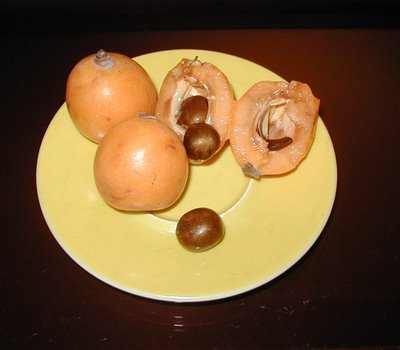Fruit encounter.
vvvvvvvvvvvvvvvvvUPDATE THURSDAY 3/20vvvvvvvvvvvvv
My friend Shelley is sure nespoli are loquats! She writes:
"We had a loquat tree in Davis and they looked EXACTLY like your picture. The descriptions match too. I think it’s the same thing. They had great flavor, sort of a cross between an apricot and something else. They don’t keep at all. As soon as you picked them they started to bruise so the kids (neighbors included) would stand under the tree while Kevin picked and distributed. They ate them on the spot, spitting those gargantuan seeds all over the place! They loved them! I wish you could have had more while you were there."
Thanks, Shelley!
vvvvvvvvvvvvvvvvvvvvvEXPANDEDvvvvvvvvvvvvvvvvvvvvv
(first posted July 14, 2006)
On the drive from Genoa to the Riviera, we noticed many trees heavily laden with small orange fruit. They looked a little like apricots, but the trees were too short, too spreading. Our Liguria guide, Fausta, said they are nespoli.
Back in Genoa, Arianna presented me with a few of these fruits.
The slightly tart fruit is extremely juicy, and as you can tell from the picture, contains three to six large, round brown seeds. They were a real suprise, popping out of the fruit's hollow center, seeming far too large to reside in such a small space.
In an attempt to uncover the fruit's identity, I've read that nespoli are also called medlars. However, pictures show a brown fruit, not an orange one. Some think it's the same as a loquat, which looks like the fruit above, but the description of the taste doesn't quite fit. Still, loquats are called Japanese medlars, so they're probably from the same family. Nespoli - Italian medlars?
I think so. At any rate, medlars have nice cameos in literarure, as a symbol of prostitution, or early dissipation. Hmmmm. Medlars are said to be "rotten before they are ripe." I don't know. With just one encounter, I couldn't learn enough to say if that is true.
UPDATE:
As I was cleaning my bookshelf this week, I found my copy of The Decadent Cookbook, by Medlar Lucan(!) and Durian Gray. These are the pen names of Alex Martin and Jerome Fletcher. If you accept that medlars are rotten before they are ripe; if you regard the smell of the durian as one of the most offensive on the planet; and if you remember that at the root of the word decadent is decay, you'll appreciate the wry wit in these authors' choice of pen names.
It's been several years since I looked at the book. Co-author's name aside, this was also the first time I'd remember actually getting some information about medlars. In the chapter entitled Decay and Corruption:
"...medlars, which resemble grenadillas, are best eaten when they have begun to decompose. To accompany the bowl of medlars was a bowl of 'pire fotute', a precise translation of which need not concern us here. This, my host informed me, was a Sicilian dish made from rotting pears which tasted like chocolate. I took his word for it. Along with the fruit we drank a glass of Sauternes. Needless to say, (my host) waxed lyrical on the subject of 'la pourriture noble' or noble rot."
That perplexed me when I first read it in the late 90s, as there wasn't a real description of the fruit or its flavor. I'm glad I now know - though the medlars I ate were anywhere close to decomposing! Ah well, next trip to Italy...
This is what Shakespeare said about nespoli in As You Lke It:
TOUCHSTONE
Truly, the tree yields bad fruit.
ROSALIND
I'll graff it with you, and then I shall graff it with a medlar: then it will be the earliest fruit i' the country; for you'll be rotten ere you be half ripe, and that's the right virtue of the medlar.
Shakespeare refers to the medlar again in Romeo and Juliet, when Mercutio mocks Romeo's unrequited love for Rosaline:
Now will he sit under a medlar tree,
And wish his mistress were that kind of fruit
As maids call medlars, when they laugh alone.
(BTW, even though R&J is set in Verona, I didn't see any nespoli trees there.)
Another reference is in Chaucer's The Reeve's Tale:
My heart, too, is as mouldy as my hairs,
Unless I fare like medlar, all perverse.
For that fruit's never ripe until it's worse,
And falls among the refuse or in straw.
We ancient men, I fear, obey this law:
Until we're rotten, we cannot be ripe;